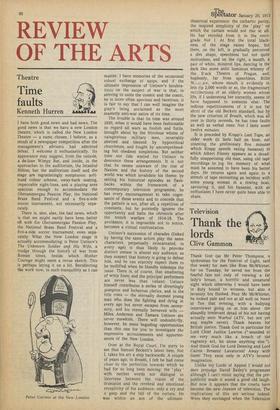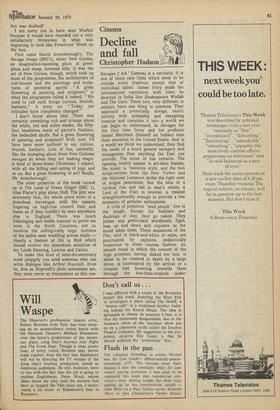Television
Thank the lords
Clive Gammon
Thank God (as Mr Peter Thompson, a spokesman for the Festival of Light, said this week) for men like Ross McWhirter, for on Tuesday, he saved me from the fearful fate not only of viewing a fat lady's breast, a horrific and unnatural sight which otherwise I would have been in duty bound to witness, but also a lavatory bin flushed. Poor Mr McWhirter, he looked pale and not at all well on News at Ten that evening, with a bullying interviewer going on at him about the absurdly irrelevant detail of his not having actually seen Warhol (ATV, but not yet and maybe never). Thank heaven for British justice. Thank God in particular for Lord Chief Justice Lawton (" sounded to me very much like a breach of the vagrancy act, let alone anything else "). And thank God for Lord Denning and Lord Cairns. Breasts! Lavatories! Away with them! They exist only in ATV's fevered imagination.
Unlike my Lords of Appeal I would not dare prejudge David Bailey's programme although I can't resist saying that the prepublicity made it sound a good old laugh. But now it appears that the courts have become the new censors of television. The implications of this are serious indeed. Were they envisaged when the Television Act was drafted?
I am sorry not to have seen Warhol because it would have rounded out a very satisfactory threesome in what was beginning to look like Primitives' Week on the box.
First came David Attenborough's The Savage Image (BBC1), about New Guinea, an imagination-haunting place of green glens and steep, forested hills. It was the art of New Guinea, though, which took up most of the programme, the architecture of cult-houses and the paintings and sculptures of ancestral spirits. " A great flowering of painting and sculpture," is what the programme Called it indeed. "We used to call such things curious, brutish, barbaric," it went on. "Today our attitudes have completely changed."
I don't know about that. There was certainly something rich and strange about the white, red and ochre masks, the fiftyfoot headdress made of parrot's feathers, the bedaubed skulls. But a great flowering of painting and sculpture? Well, now, I'd have been more inclined to say curious, brutish, barbaric. Lots of fun, naturally, like the stomping about these New Guinean savages do when they are making magic. A kind of down-home Christmas, I expect,. with all the killing and eating of pigs, and so on. But a great flowering of art? Really, Mr Attenborough!
The other primitive of the week turned up in The Land of Green Ginger (BBC 1), Alan Plater's play about Hull. The plot was extremely thin, the whole piece more of a downbeat travelogue with the camera lingering on high-rise council flats and
buses as if they couldn't be seen anywhere else in England. There was much folksinging and feeble humour to prove we were in the North Countree, not to mention the unforgivably huge bottoms of the ladies seen waddling across roads — clearly a feature of life in Hull which should receive the immediate attention of my Lords Denning, Lawton and Cairns.
To make this kind of semi-documentary work properly you need someone who can write dialogue like Arthur Hoperaft. Even so, thin as Hoperaft's plots sometimes are, they were never as transparent as this one.



































 Previous page
Previous page